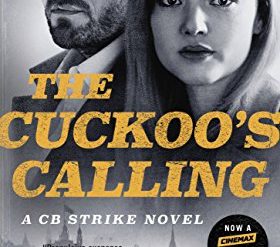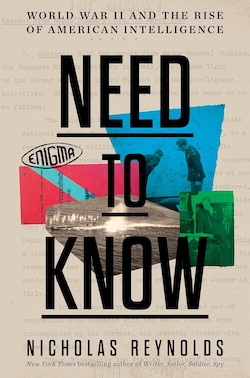
Clichés abound in descriptions of World War II. After all, it was the greatest cataclysm in the history of the human race. And books about the events of 1937 to 1945 crowd library shelves throughout the English-speaking world. Amazon lists more than 6,000 titles, though that’s surely an undercount. No doubt more than that number have been published in every decade since 1945. Relatively few merit reading today.
Espionage attracts hordes of writers and readers, too. Mash the two subjects together into “WWII books about espionage,” and you’ll discover a rich record of the spies, saboteurs, guerrillas, and code-breakers who labored in their own often idiosyncratic ways to shift the course of the war.
A highly selective list
As best I can tell with the crude software that governs my website, I’ve read and reviewed more than 500 books about World War II and more than 400 about espionage. Here I’m listing the ten top nonfiction books that fall neatly into both categories. And I’ve added a baker’s dozen of runners-up.
You might wonder how I picked such a small number of books from among the many I’ve reviewed. For starters, I awarded each of the ten top titles five stars. But that rating wasn’t enough to make the cut. These books represent not just great stories but tales that surprised me with new information or fresh perspective. Which helps explain why several of the books cited below are about the roles women played in the war. Only in recent years have their stories been told in full. And such great stories they are!
Within each of the two lists below the books appear in alphabetical order by the authors’ last names. The links lead to my reviews.
The 10 top WWII books about espionage
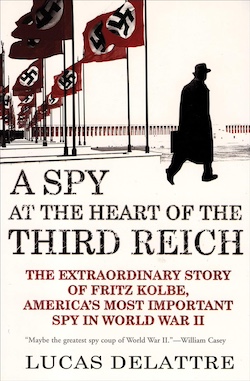
A Spy at the Heart of the Third Reich: The Extraordinary Story of Fritz Kolbe, America’s Most Important Spy in World War II by Lucas Delattre (2005) 321 pages ★★★★★—The little-known tale of the top spy in Nazi Germany
One of the reasons the resistance to Nazism within Germany itself was so meager was the refusal of the Allies to support the men and women who opposed Hitler. (They did so in many of the occupied nations.) Still, many brave souls persisted, hoping to overturn the Third Reich and reach a peace agreement with the Americans and British. But the Allies demanded unconditional surrender. And few in Germany could countenance the utter subjugation of the land they loved. One of those few exceptional individuals was a mid-level official in the German Foreign Ministry named Fritz Kolbe—and he became the top American spy in the war. In A Spy at the Heart of the Third Reich, French journalist Lucas Delattre tells the astonishing story of Kolbe’s three-year work funneling top-secret documents from Berlin to the CIA in Bern, Switzerland.
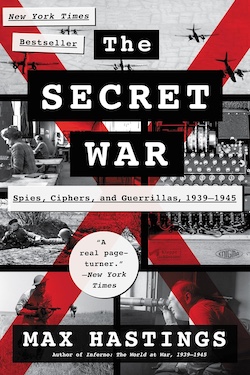
The Secret War: Spies, Ciphers, and Guerrillas, 1939-1945 by Max Hastings (2016) 645 pages ★★★★★—A revisionist history of intelligence in World War II
The eminent British historian Max Hastings undercuts many popular treatments of espionage during World War II with a sober revisionist survey. In his well-informed view, practically nothing either side did in the realm of intelligence had any meaningful impact on the war. In other words, their efforts were tactical, not strategic. The only exceptions, in his view, were the successful efforts by all the major combatants to crack their enemies’ secret codes. Unlike most other books about the subject, Hastings examines not just the British and American intelligence efforts but those of Russia, Germany, and Japan as well. This is must reading for anyone who wants to understand how espionage really works (or, more often, doesn’t).
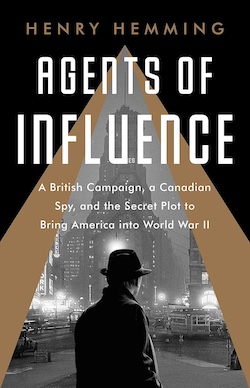
Agents of Influence: A British Campaign, a Canadian Spy, and the Secret Plot to Bring America Into World War II by Henry Hemming (2019) 401 pages ★★★★★—British interference in American politics in WWII
Historians suggest that Winston Churchill’s constant stream of cables and face-to-face meetings helped persuade Franklin Roosevelt to drag the United States into the defense of Britain. But few observers and analysts remark about another factor that may well have been more decisive: British interference in American politics in 1940 and 1941 that helped shift public opinion from isolationism to engagement. Because FDR had perfected to a fine art the practice of “leading from behind.” And that’s central to the story so ably told by Henry Hemming in Agents of Influence.
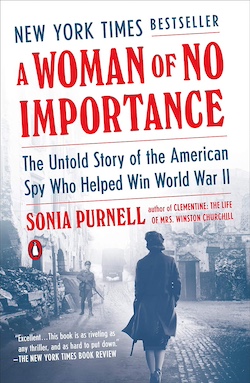
A Woman of No Importance: The Untold Story of the American Spy Who Helped Win World War II by Sonia Purnell (2019) 368 pages ★★★★★—The WWII American woman spy who kept the French Resistance alive
Popular fiction abounds with superheroes. But it’s rare that you’ll come across a true-to-life story of a person who comes even close to the sort of over-the-top heroism that so many popular writers favor. However, the WWII American woman spy Virginia Hall (1906-82) fits that bill. In A Woman of No Importance, Sonia Purnell relates the woman’s experience in World War II in compelling and often jaw-dropping detail. It’s one of the best studies I’ve ever read about the British Special Operations Executive (SOE), the American Office of Strategic Services (OSS), and the French Resistance. I found it nearly impossible to put the book down.
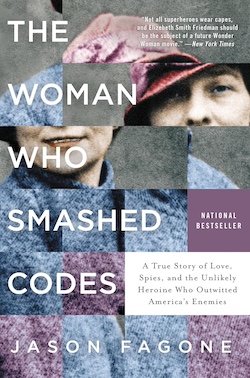
The Woman Who Smashed Codes: A True Story of Love, Spies, and the Unlikely Heroine Who Outwitted America’s Enemies by Jason Fagone (2017) 464 pages ★★★★★—The woman codebreaker who caught gangsters and Nazi spies
Working with recently declassified files from the World War II era as well as long-ignored archival records and contemporary press reports and interviews, journalist Jason Fagone has brought to light at last the astonishing story of Elizebeth Smith Friedman and her husband, William Friedman. The Friedmans may well have been the most important 20th-century American codebreakers, and quite possibly the best and most successful in the world. Their impact lingers. The National Security Agency (NSA) dedicated its first operations building as the William and Elizebeth Friedman Building.
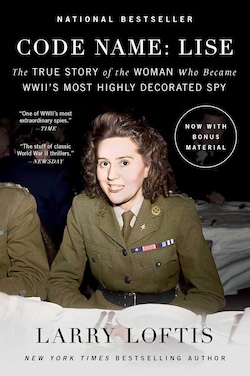
Code Name: Lise: The True Story of the Woman Who Became World War II’s Most Highly Decorated Spy by Larry Loftis (2019) 385 pages ★★★★★—A woman was World War II’s most highly decorated spy
She was the most decorated spy in World War II of either gender. Her name was Odette Sansom (later Odette Hallowes). From 1942 to 1945, she served as an officer of Britain’s Special Operations Executive. From November 1942 to April 1943, she worked in southern France as a courier for an SOE network that delivered arms, money, and supplies to the French Resistance. Betrayed by the witless leader of a French network operating in the same area, she was arrested in 1943 and spent the rest of the war in prison. And when it was all over, she emerged as the war’s most highly decorated spy. Yet these bare-bones facts convey not a hint of the woman’s almost superhuman courage, the subject of Larry Loftis‘s excellent portrait, Code Name: Lise.
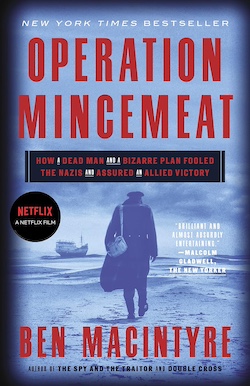
Operation Mincemeat: How a Dead Man and a Bizarre Plan Fooled the Nazis and Assured Allied Victory by Ben Macintyre (2010) 434 pages ★★★★★—How the Allies fooled the Nazis with a corpse
Ben MacIntyre is one of the most prolific and popular of the many historians who have specialized in World War II. And Operation Mincemeat is to me the most compelling of several of his books that I’ve read. The book is the improbable story of the deception scheme that misled the Nazis about the Allied invasion of Sicily, directing their attention instead to southern France. British intelligence accomplished this by planting misinformation on the dead body of a supposed “courier” who washed up on the coast of Spain. This astonishing book brings history to life with intimate and telling detail.
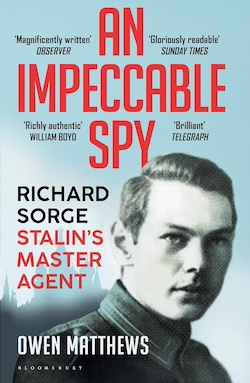
An Impeccable Spy: Richard Sorge, Stalin’s Master Agent by Owen Matthews (2019) 448 pages ★★★★★—The greatest spy of the twentieth century?
Richard Sorge was an active Communist in Germany who began spying for the Comintern immediately after World War I and, later, for Soviet military intelligence (today the GRU). Nonetheless, he managed to join the Nazi Party and eventually become a close personal friend and part-time employee of the German ambassador to Tokyo. Through his access to top-secret Nazi communications, he was able to advise his handlers in Moscow of Germany’s intention to invade the Soviet Union (which Stalin refused to believe).
Meanwhile, he was also running agents who were embedded at the very top of the Japanese government. As a result, he was able to monitor Japan’s on-and-off-again plans to invade Siberia. After all, they had humiliated Russia in the 1904-5 Russo-Japanese War, and they knew Stalin was eager for revenge. That possibility was one of the Kremlin’s greatest fears—and it governed the Japanese Army’s strategy for many years until the attack on Pearl Harbor.
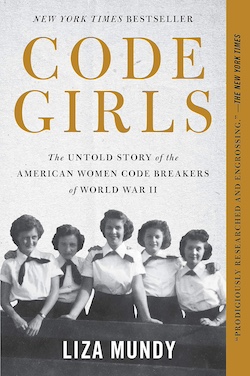
Code Girls: The Untold Story of the American Women Code Breakers of World War II by Liza Mundy (2017) 433 pages ★★★★★—The amazing story of the American “Code Girls” who helped win World War II
During World War II more than 10,000 women worked on cryptography for the US Army and Navy in Washington, DC. They were sworn to secrecy about their work, and to this day some of those who survive, now in their 90s or even older, are still reluctant to talk about it. But some of them were instrumental in the Allies’ greatest successes in signals intelligence. In fact, three breakthroughs in untangling Axis codes were decisive, including cracking the German Enigma and the Japanese Purple codes. And, as Liza Mundy reveals in Code Girls, most of those who worked on all three were women.
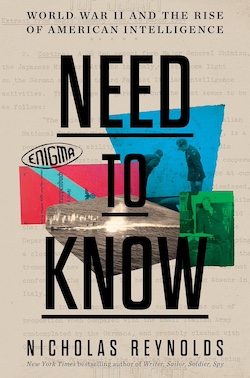
Need to Know: World War II and the Rise of American Intelligence by Nicholas Reynolds (2022) 512 pages ★★★★★—The rise of American intelligence in World War II
World War II began for the United States with a catastrophic intelligence failure at Pearl Harbor. Two decades earlier, during the First World War, the US military had begun building capacity in signals and communications intelligence. But little was left in place by 1941. Yet, just four years later, tens of thousands of Americans were working round the clock in Army, Navy, State Department, and FBI intelligence units and the Office of Strategic Services. Author Nicholas Reynolds tells the story of how this all came about in Need to Know, an eye-opening account of the rise of American intelligence.
Top nonfiction books about WWII espionage: 13 runners-up
Night of the Assassins: The Untold Story of Hitler’s Plot to Kill FDR, Churchill, and Stalin by Howard Blum (2020) 384 pages ★★★★★
The Irregulars: Roald Dahl and the British Spy Ring in Wartime Washington by Jennet Conant (2008) 418 pages ★★★★☆
The Catcher Was a Spy: The Mysterious Life of Moe Berg by Nicholas Dawidoff (1994) 437 pages ★★★★☆
Nancy Wake: The Gripping True Story of the Woman Who Became the Gestapo’s Most Wanted Spy by Peter Fitzsimmons (2011) 329 pages ★★★★★
The Bastard Brigade: The True Story of the Renegade Scientists and Spies Who Sabotaged the Nazi Atomic Bomb by Sam Kean (2019) 465 pages ★★★★☆
Bletchley Park and D-Day: The Untold Story of How the Battle for Normandy Was Won by David Kenyon (2019) 295 pages ★★★★☆
The Dirty Tricks Department: Stanley Lovell, the OSS, and the Masterminds of World War II Secret Warfare by John Lisle (2023) 384 pages ★★★★☆
Rogue Heroes: The History of the SAS, Britain’s Secret Special Forces Unit that Sabotaged the Nazis and Changed the Nature of War by Ben Macintyre (2016) 400 pages ★★★★★
Double Cross: The True Story of the D-Day Spies by Ben Macintyre (2012) 450 pages ★★★★☆
Madame Fourcade’s Secret War: The Daring Young Woman Who Led France’s Largest Spy Network Against Hitler by Lynne Olson (2019) 464 pages ★★★★★
D-Day Girls: The Spies Who Armed the Resistance, Sabotaged the Nazis, and Helped Win World War II by Sarah Rose (2019) 372 pages ★★★★☆
Poland Alone: Britain, SOE and the Collapse of the Polish Resistance,1944 by Jonathan Walker (2008) 384 pages ★★★★☆
Wild Bill Donovan: The Spymaster Who Created the OSS and Modern American Espionage by Douglas Waller (2011) 482 pages ★★★★★
For related reading
For a broader view of the world of intelligence, see 30 good nonfiction books about espionage and The 15 best espionage novels.
You might also enjoy:
- 10 top nonfiction books about World War II
- Books about World War II in the Pacific
- The 10 best novels about World War II
- Good books about the Holocaust
- 7 common misconceptions about World War II
- The 10 most consequential events of World War II
And you can always find my most popular reviews, and the most recent ones, on the Home Page.

